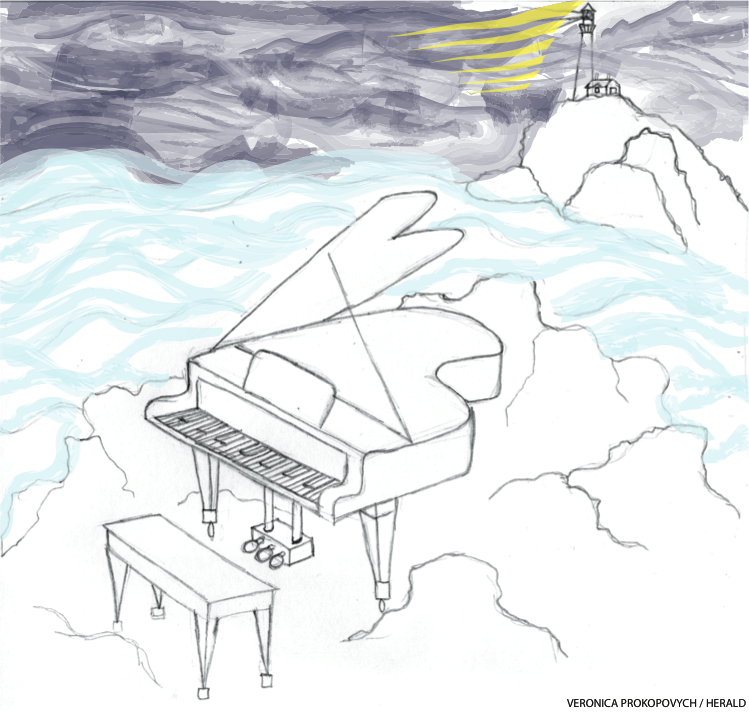Thunderstorm Pianist
Short Story
He was a violent and callous man, only half in control of his emotions, his impulses, his body, at any given time. He was prone to outbursts of rage like hailstorms, unpredictably present even on the brightest of summer days. Sullen and angry, he lurked behind knitted brows in his darkened room, as if the storm clouds of his mind could serve to wall him off from the world, from me, as if he was trying to prove that the eye of the storm in the center of that self-imposed maelstrom wasn’t worth battling your way through the wall of wind to get there. He was explosive. Volatile. His words flew like projectiles across our small apartment, darkening our shared skies as effectively as a medieval hail of arrows upon a besieged keep. Sometimes, rarely, they didn’t have enough impact for his purposes. My own careless words cast shadows upon my skin in the form of bruises, an errant fist in a fit of fury, a lightning strike from the darkened clouds of his tempest, and not only was I stranded in his storm, my words piled up over my head in the form of a lightning rod. I was, occasionally, struck.
He was, in the simplest of terms, a genius. A virtuoso. He could do things with music that I couldn’t dream of, could produce the most complex assortments of sounds layered atop one another like a flock of startled birds all flying in the same direction. The piano danced to his tune as he sat alone atop that weather-beaten stage, the wooden floor scarred and scuffed by years of accumulated, collected creative inspiration. Like him. His hands lilted over the keys with the delicacy of a surgeon’s, rising and falling with the tempo, the music becoming him as much as he embodied it. His face remained perfectly calm, every time, concentrated on the motion of his hands, the waves of sound as they crashed out from the grand, dragging every member of the audience to the edges of their seats like a clever riptide. On that stage, he moved and acted with more care and precision than he exhibits anywhere else, than I have seen any man exhibit anywhere else. His storm is controlled, harnessed to the keys, each note a singular drop of rain, each crescendo of accumulated, jumbled, glorious sound a peal of magnificent thunder.
His lightning strikes those ivory keys hundreds of times each minute, and yet they do not bruise.
But I do. I still do, despite his glory, despite the enraptured audiences that rise to their feet in waves mimicking those that emanate from the Bechstein when he sits behind it, despite the number of times his face appears in the paper, a storm still rages in our apartment, one of a different nature than the beautiful ones that ring out on the stage. I still know by heart the tell tale signs of when he is composing, and know that to open the door to our bedroom at those times is to invite his passionate ire. I still avoid the piano in our room like the plague, and despite the beautiful music it brings out of the beautiful man that sits behind it in that beautiful concert hall, it is still the monster in my closet, looming over me in my sleep.
I’ve been asked before why I don’t leave him. An old acquaintance of ours, upon noticing the lightning strikes marring my jawline, knew enough about his nature to ask, in private, why I didn’t do anything, how I could live with his storm cloud hanging above my head like the sword of Damocles. I couldn’t answer. I couldn’t explain to her that I only saw the genius, not the destructive force that corroded him. I couldn’t explain that the way his storm danced over those keys made up for every time it slammed into the doors of our house with shuddering force, that for each rare day when the sun shone, it burned away a hundred days of his oppressive thunder. That it was not Stockholm Syndrome, rather an instinctive trust that he couldn’t be defined solely by the outward manifestations of his shadowed mind, and instead must be by the music that swirled around him like the storm’s temper. I knew not to leave him because, despite the fact that he has never once apologized with his entire heart in it, he sits on that stage with guilt pressing on his shoulders, and sorrow pulling each finger to the next beautiful note. No one knows the intricacies of his face better than I, and when I watch him perform in that beautiful concert hall, I am the only one who notices that he strikes the keys with such force that they nearly crack under the weight of the storm wrapped around him.
Featured image courtesy of Veronica Prokopovych
